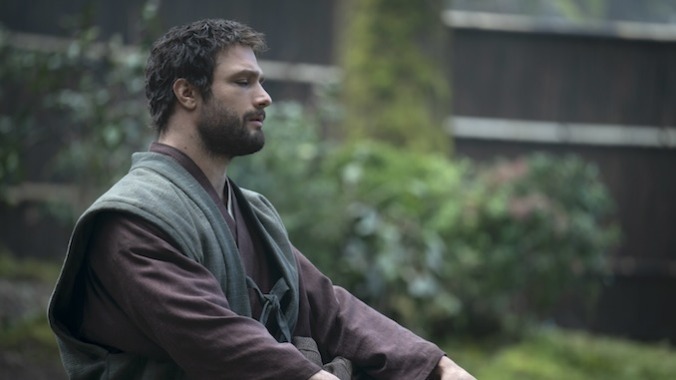Shōgun’s Finale Is an Elegy Instead of a Bloodbath, and the Series Is Better for It
Photo Courtesy of FX

For a considerable chunk of Shōgun’s 10-episode run, it seemed like things would end how you’d expect from this brand of historical epic: in a grandiose pitched battle. Early on, as Lord Toranaga (Hiroyuki Sanada) laid the groundwork for defeating his political rivals, the council of regents, we saw shots of sweeping armies, implying they would eventually be shown meeting their foes in the field. While other historical epics and, well, actual history have established this expectation, the show eventually backed away from this outcome during Episode 6 when it alluded to the “Crimson Sky” plot. Here, it suggested a new blueprint for how things would go, laying out a smaller-scale sneak attack involving our nominal protagonist, John Blackthorne (Cosmo Jarvis), using his English boat’s firepower to swiftly dispatch Toranaga’s political adversaries in Osaka.
Normally, this kind of last-ditch plan would come in the finale, making for a guns-blazing climax where our leading characters survive by the skin of their teeth, losing a few brave companions along the way. But thanks to Toranaga’s (and the writers’) clever scheming, even this second layer isn’t quite what it seems. In the ninth and penultimate episode of the series, aptly titled “Crimson Sky,” Toranaga dispatches his vassal Lady Mariko (Anna Sawai) and Blackthorne to Osaka, seemingly to surrender on his behalf. But in reality, Mariko and Toranaga have something else in mind, giving her the chance to finally get revenge for her murdered family.
She sows internal division by drawing attention to how the head of the council of regents, Ishido (Takehiro Hira), has trapped the other regents and their families. After she gets Ishido to publicly allow her to leave, putting pressure on him to do the same for the rest of the hostages, he privately sends shinobi to capture her. The assailants corner Mariko, Blackthorne, and their retainers inside a storage shack as the ninja set up explosives to pull them out of hiding. However, Ishido’s plans suddenly go sideways when Mariko steps in front of the blast. She announces that she does this in protest of Ishido going back on his word, but in reality, she knows that her death will be the critical piece that causes the other nobles to cut ties with Ishido, eroding his support so that Toranaga can eventually deliver the final blow and become the shōgun. As he later explains, she was Crimson Sky.
As for where this leaves the finale of what’s quickly become one of the most talked-about shows of the year, the last episode of Shōgun, “A Dream of a Dream,” ends up less a propulsive denouement and more a somber comedown, an elegy for a single person that wrings the weight of their absence from every frame. By trading a flashy battle for an emotionally devastating gauntlet, it pays out on nearly every character arc and cements the show as one of the most memorable and moving in recent memory.
When we catch up with those who knew Mariko, they’re figuratively—and sometimes literally—shell-shocked. Yabushige (Tadanobu Asano) is borderline a different person, his regular boisterousness and treachery completely overshadowed by a concussion and deep guilt over betraying Mariko. Despite being someone who used every underhanded tactic imaginable to even moderately improve his chances of survival, we see that with her passing, he finally realizes that his selfishness was fruitless and that some things are more important than self-preservation.
We find that Mariko’s friend-turned-enemy Lady Ochiba (Fumi Nikaido), who previously vowed never to side with Toranaga, was similarly rocked by the news. In their last meeting, Mariko said “Flowers are only flowers because they fall,” referring to how the beauty of flowers and life extends from their impermanence while also implying to Ochiba that she intends to sacrifice herself. Although Ochiba remains cool on the outside even after her friend is gone, we can feel the emotion swell as she completes Mariko’s poem and, by extension, her will. “Flowers are only flowers because they fall, but thankfully the wind,” meaning that even though Mariko is gone, Ochiba will act as the wind that will bring her to where she could never go, fulfilling her dream of toppling the government that butchered her family.
-

-

-

-

-

-

-

-

-

-

-

-

-

-

-

-

-

-

-

-

-

-

-

-

-

-

-

-

-

-

-

-

-

-

-

-

-

-

-

-








































